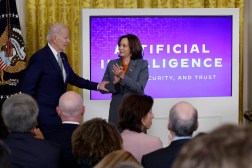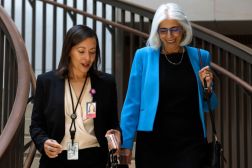HHS developing new AI strategic plan

The Department of Health and Human Services is working on a new strategic plan for the use of artificial intelligence across the entire breadth of its mission, the department’s top AI official said Tuesday.
Micky Tripathi — HHS’s acting chief AI officer and its assistant secretary for technology policy — said at the NVIDIA AI Summit in Washington, D.C., that the AI strategic plan should arrive sometime in January and that it will span “the entire, you know, sort of breadth of what the department covers.”
During a panel discussion, Tripathi detailed the complex web of mission sets spanning “the value chain of life sciences and health care” that HHS oversees that the new strategic plan will attempt to wrap its arms around. Those include medical research and discovery, preclinical work, measuring the safety and effectiveness of medical products, health care delivery, health technology standards setting, human services, public health and more, he said.
The development of the strategic plan comes after HHS earlier this year reorganized its technology, data, AI and cybersecurity offices, mainly moving portfolios from the Assistant Secretary for Administration to other components. That change resulted in Tripathi, who was already acting CAIO and national coordinator for health IT, being named assistant secretary for technology policy.
Tripathi explained that the new AI strategic plan “looks across the department as we think about the health care sector generally, so it’s both externally focused as well as internal saying: Where do we see from just a general public policy perspective the needs of the industry and all of those domains across that entire value chain … what role does the federal government play in each of those areas? What potential roles does AI play in each of those areas? And you all know the answer to that: Pretty significant roles in each one of those areas.”
It also looks to spur innovation, he said, by asking: “Are there things that we may be getting in the way of” the innovation happening in the private sector?
On the topic of innovation, Tripathi said the department is receiving more feedback that developers in the medical space “desire guardrails to help channel that innovation appropriately.”
“We hear more and more about people being concerned about getting too innovative in the health care space,” he said. At the same time, HHS wants to be cognizant of the “areas that the federal government really ought to just not get in the way.”
“There are lots of areas where … we’re going to deliberately say: ‘You know what? The market has got this. And let’s let the market, you know, sort of keep running with this and, you know, keep monitoring it. So we’re looking across all of that as a part of the strategic plan,” he said.
On the operational side, Tripathi pointed out that HHS is one of the largest users of AI in the federal government. And the department’s AI use case inventory, which is required by executive order to be made publicly available, is going to continue to grow, he said.
“In 2023 I think across the entire federal government there was something like 600 named AI use cases,” he said. “Health and Human Services I think was roughly a third of those. I think we were the second largest user of AI systems. … This year, we’re putting all of those together now, assembling those from all of our agency partners, and that number, as you can imagine, is gonna be a lot bigger than it was last year, which was 163.”






